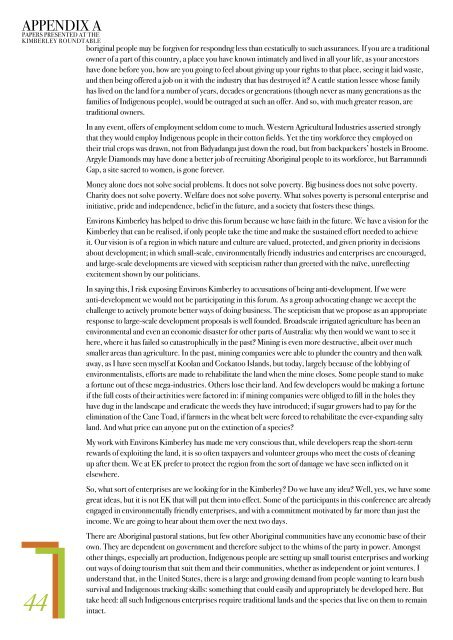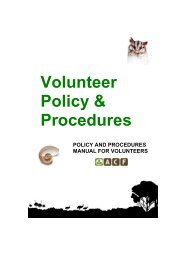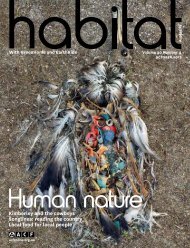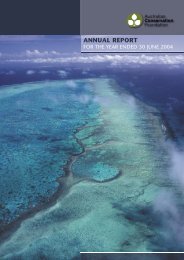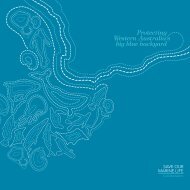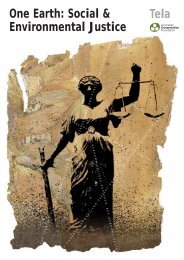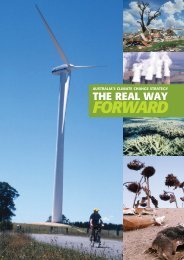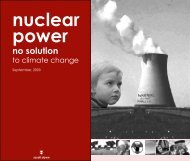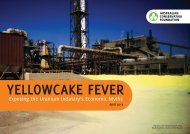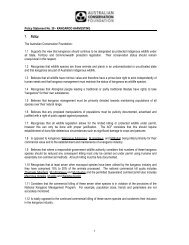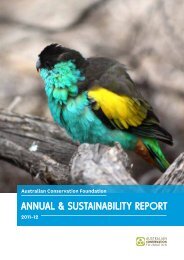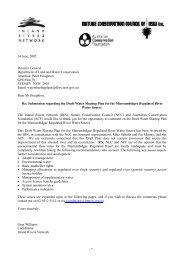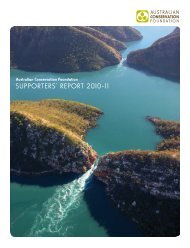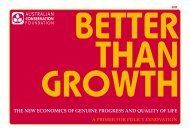Kimberley Appropriate Economics Interim Report - Australian ...
Kimberley Appropriate Economics Interim Report - Australian ...
Kimberley Appropriate Economics Interim Report - Australian ...
You also want an ePaper? Increase the reach of your titles
YUMPU automatically turns print PDFs into web optimized ePapers that Google loves.
44<br />
boriginal people may be forgiven for respondng less than ecstatically to such assurances. If you are a traditional<br />
owner of a part of this country, a place you have known intimately and lived in all your life, as your ancestors<br />
have done before you, how are you going to feel about giving up your rights to that place, seeing it laid waste,<br />
and then being offered a job on it with the industry that has destroyed it? A cattle station lessee whose family<br />
has lived on the land for a number of years, decades or generations (though never as many generations as the<br />
families of Indigenous people), would be outraged at such an offer. And so, with much greater reason, are<br />
traditional owners.<br />
In any event, offers of employment seldom come to much. Western Agricultural Industries asserted strongly<br />
that they would employ Indigenous people in their cotton fields. Yet the tiny workforce they employed on<br />
their trial crops was drawn, not from Bidyadanga just down the road, but from backpackers’ hostels in Broome.<br />
Argyle Diamonds may have done a better job of recruiting Aboriginal people to its workforce, but Barramundi<br />
Gap, a site sacred to women, is gone forever.<br />
Money alone does not solve social problems. It does not solve poverty. Big business does not solve poverty.<br />
Charity does not solve poverty. Welfare does not solve poverty. What solves poverty is personal enterprise and<br />
initiative, pride and independence, belief in the future, and a society that fosters these things.<br />
Environs <strong>Kimberley</strong> has helped to drive this forum because we have faith in the future. We have a vision for the<br />
<strong>Kimberley</strong> that can be realised, if only people take the time and make the sustained effort needed to achieve<br />
it. Our vision is of a region in which nature and culture are valued, protected, and given priority in decisions<br />
about development; in which small-scale, environmentally friendly industries and enterprises are encouraged,<br />
and large-scale developments are viewed with scepticism rather than greeted with the naïve, unreflecting<br />
excitement shown by our politicians.<br />
In saying this, I risk exposing Environs <strong>Kimberley</strong> to accusations of being anti-development. If we were<br />
anti-development we would not be participating in this forum. As a group advocating change we accept the<br />
challenge to actively promote better ways of doing business. The scepticism that we propose as an appropriate<br />
response to large-scale development proposals is well founded. Broadscale irrigated agriculture has been an<br />
environmental and even an economic disaster for other parts of Australia: why then would we want to see it<br />
here, where it has failed so catastrophically in the past? Mining is even more destructive, albeit over much<br />
smaller areas than agriculture. In the past, mining companies were able to plunder the country and then walk<br />
away, as I have seen myself at Koolan and Cockatoo Islands, but today, largely because of the lobbying of<br />
environmentalists, efforts are made to rehabilitate the land when the mine closes. Some people stand to make<br />
a fortune out of these mega-industries. Others lose their land. And few developers would be making a fortune<br />
if the full costs of their activities were factored in: if mining companies were obliged to fill in the holes they<br />
have dug in the landscape and eradicate the weeds they have introduced; if sugar growers had to pay for the<br />
elimination of the Cane Toad, if farmers in the wheat belt were forced to rehabilitate the ever-expanding salty<br />
land. And what price can anyone put on the extinction of a species?<br />
My work with Environs <strong>Kimberley</strong> has made me very conscious that, while developers reap the short-term<br />
rewards of exploiting the land, it is so often taxpayers and volunteer groups who meet the costs of cleaning<br />
up after them. We at EK prefer to protect the region from the sort of damage we have seen inflicted on it<br />
elsewhere.<br />
So, what sort of enterprises are we looking for in the <strong>Kimberley</strong>? Do we have any idea? Well, yes, we have some<br />
great ideas, but it is not EK that will put them into effect. Some of the participants in this conference are already<br />
engaged in environmentally friendly enterprises, and with a commitment motivated by far more than just the<br />
income. We are going to hear about them over the next two days.<br />
There are Aboriginal pastoral stations, but few other Aboriginal communities have any economic base of their<br />
own. They are dependent on government and therefore subject to the whims of the party in power. Amongst<br />
other things, especially art production, Indigenous people are setting up small tourist enterprises and working<br />
out ways of doing tourism that suit them and their communities, whether as independent or joint ventures. I<br />
understand that, in the United States, there is a large and growing demand from people wanting to learn bush<br />
survival and Indigenous tracking skills: something that could easily and appropriately be developed here. But<br />
take heed: all such Indigenous enterprises require traditional lands and the species that live on them to remain<br />
intact.


